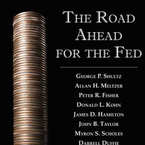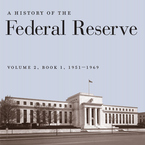Allan H. Meltzer
|
|
Allan Meltzer is a distinguished visiting fellow at the Hoover Institution and the Allan H. Meltzer University Professor of Political Economy at the Tepper School of Business at Carnegie Mellon University. He has been a visiting professor at Harvard, the University of Chicago, the University of Rochester, the Yugoslav Institute for Economic Research, the Austrian Institute for Advanced Study, the Getulio Vargas Foundation in Rio de Janeiro, and the City University, London. He has served as a consultant for several congressional committees, the President's Council of Economic Advisers, the US Treasury Department, the Board of Governors of the Federal Reserve System, the World Bank, foreign governments, and central banks. He has been a member of the President's Economic Policy Advisory Board. In 1988–89, he was an acting member of the President's Council of Economic Advisers. From 1986 to 2002, he was an honorary adviser to the Institute for Monetary and Economic Studies of the Bank of Japan.
In 1999–2000, he served as chairman of the International Financial Institution Advisory Commission, known as the Meltzer Commission, which proposed major reforms of the International Monetary Fund and the development banks.
Professor Meltzer's writings have appeared in numerous journals; his most recent publication is Why Capitalism? (Oxford University Press, 2012). He has authored several other books, including A History of the Federal Reserve (University of Chicago Press, 2 volumes, 2003 and 2009) and numerous papers on economic theory and policy. His career includes experience as a self-employed businessman, management adviser, and consultant to banks and financial institutions.
In 1983, Professor Meltzer received a medal for distinguished professional achievement from the University of California, Los Angeles. He was named the distinguished fellow for 2011 by the American Council for Capital Formation and is a distinguished fellow of the American Economic Association. In 2003 he received the Irving Kristol Award from the American Enterprise Institute and the Adam Smith Award from the National Association for Business Economics. In 2009, he received the Distinguished Teacher Award from the International Mensa Foundation. In 2011 Professor Meltzer received the Bradley Award, the Harry Truman Medal for Public Policy, and the Truman Medal for Economic Policy.







